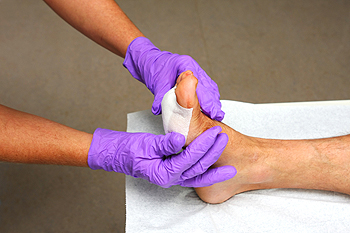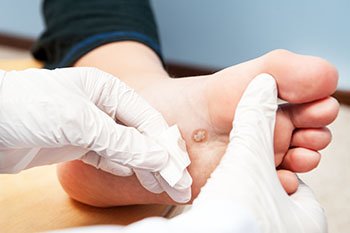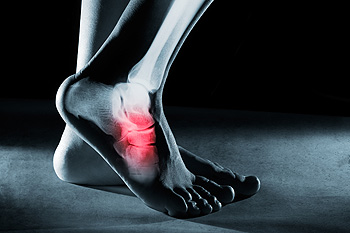Connect With Us
Blog

Diabetic foot ulcers pose a serious risk to those with diabetes, often flying under the radar until they become severe. The condition arises due to poor blood circulation and nerve damage, making it less likely for individuals to notice when their feet are injured. These ulcers typically occur on the soles of the feet or pressure points like the heels and toes, where friction and pressure are high. After a podiatrist removes dead tissue and cleanses the affected area, it is important to keep weight off the foot to prevent further complications and promote healing. Prevention is key, involving daily foot inspections, proper footwear, regular foot hygiene, and blood sugar management. Consulting a podiatrist is essential for diabetic patients to receive specialized care and guidance in preventing and managing foot ulcers. With their expertise, individuals can better safeguard their feet and overall well-being, avoiding the potentially devastating consequences of diabetic foot ulcers. If you have diabetes, it is strongly suggested that you add a podiatrist to your healthcare team.
Wound care is an important part in dealing with diabetes. If you have diabetes and a foot wound or would like more information about wound care for diabetics, consult with one of our podiatrists from Podiatry Care Specialists. Our doctors will assess your condition and provide you with quality foot and ankle treatment.
What Is Wound Care?
Wound care is the practice of taking proper care of a wound. This can range from the smallest to the largest of wounds. While everyone can benefit from proper wound care, it is much more important for diabetics. Diabetics often suffer from poor blood circulation which causes wounds to heal much slower than they would in a non-diabetic.
What Is the Importance of Wound Care?
While it may not seem apparent with small ulcers on the foot, for diabetics, any size ulcer can become infected. Diabetics often also suffer from neuropathy, or nerve loss. This means they might not even feel when they have an ulcer on their foot. If the wound becomes severely infected, amputation may be necessary. Therefore, it is of the upmost importance to properly care for any and all foot wounds.
How to Care for Wounds
The best way to care for foot wounds is to prevent them. For diabetics, this means daily inspections of the feet for any signs of abnormalities or ulcers. It is also recommended to see a podiatrist several times a year for a foot inspection. If you do have an ulcer, run the wound under water to clear dirt from the wound; then apply antibiotic ointment to the wound and cover with a bandage. Bandages should be changed daily and keeping pressure off the wound is smart. It is advised to see a podiatrist, who can keep an eye on it.
If you have any questions, please feel free to contact our offices located in West Chester, and Broomall, PA . We offer the newest diagnostic and treatment technologies for all your foot care needs.

Plantar warts, caused by the human papillomavirus, or HPV, are skin growths appearing on the soles of the feet, often transmitted in warm, moist environments. Though generally harmless, they can cause discomfort and resemble different problems, necessitating careful diagnosis. Treatments vary from conservative remedies to professional interventions like salicylic acid, cryotherapy, or surgery, with responses varying among individuals. Given their contagious nature, prompt treatment is advised to prevent spread. Differential diagnosis is vital to rule out more serious conditions like melanoma. Consulting a podiatrist ensures accurate identification and tailored treatment. Their expertise in foot health management, including the effective removal of plantar warts, promotes overall well-being. If you suspect plantar warts or experience foot discomfort, it is suggested that you seek professional evaluation and treatment from a podiatrist for the best outcome.
Plantar warts can be very uncomfortable. If you need your feet checked, contact one of our podiatrists from Podiatry Care Specialists. Our doctors will assist you with all of your foot and ankle needs.
About Plantar Warts
Plantar warts are the result of HPV, or human papillomavirus, getting into open wounds on the feet. They are mostly found on the heels or balls of the feet.
While plantar warts are generally harmless, those experiencing excessive pain or those suffering from diabetes or a compromised immune system require immediate medical care. Plantar warts are easily diagnosed, usually through scraping off a bit of rough skin or by getting a biopsy.
Symptoms
- Lesions on the bottom of your feet, usually rough and grainy
- Hard or thick callused spots
- Wart seeds, which are small clotted blood vessels that look like little black spots
- Pain, discomfort, or tenderness of your feet when walking or standing
Treatment
- Freezing
- Electric tool removal
- Laser Treatment
- Topical Creams (prescription only)
- Over-the-counter medications
To help prevent developing plantar warts, avoid walking barefoot over abrasive surfaces that can cause cuts or wounds for HPV to get into. Avoiding direct contact with other warts, as well as not picking or rubbing existing warts, can help prevent the further spread of plantar warts. However, if you think you have developed plantar warts, speak to your podiatrist. He or she can diagnose the warts on your feet and recommend the appropriate treatment options.
If you have any questions please feel free to contact our offices located in West Chester, and Broomall, PA . We offer the newest diagnostic and treatment technologies for all your foot and ankle needs.

Multiple hereditary exostoses, or MHE, is a rare genetic disorder characterized by the development of multiple benign bone tumors, called osteochondromas, on the bones of the skeleton. These growths typically appear during childhood and adolescence and can affect various bones, including those in the feet and ankles. In the feet, MHE may lead to deformities, such as toe angulation, limb length discrepancies, and altered gait patterns. This can result in pain, limited mobility, and cosmetic concerns. If you have the symptoms described here, it is strongly suggested that you schedule an appointment with a podiatrist who can diagnose the problem and provide appropriate treatment. If it is an MHE-related foot and ankle issue, the podiatrist will determine if custom-made orthotic interventions that can provide support and improve foot function will be helpful, or if surgical interventions need to be performed that can correct deformities or remove problematic osteochondromas. If you have been afflicted with this rare foot condition, it is suggested that you are under the care of a podiatrist who can help you manage MHE.
Some foot conditions may require additional professional care. If you have any concerns, contact one of our podiatrists of Podiatry Care Specialists. Our doctors can provide the care you need to keep you pain-free and on your feet.
Rare Foot Conditions
The majority of foot conditions are common and can be treated by a podiatrist. Standard diagnostic procedures are generally used to identify specific conditions and treatment can be rendered. A podiatrist also treats rare foot conditions which can be difficult to diagnose and may need extra attention and care.
There are many rare foot conditions that can affect children. Some of these can include:
- Freiberg’s disease
- Kohler’s disease
- Maffucci syndrome
Freiberg’s disease - This can be seen as a deterioration and flattening of a metatarsal bone that exists in the ball of the foot. It typically affects pre-teen and teenage girls, but can affect anyone at any age. Symptoms that can accompany this can be swelling, stiffness, and the patient may limp.
Kohler’s disease - This often targets the bone in the arch of the foot and affects younger boys. It can lead to an interruption of the blood supply which ultimately can lead to bone deterioration. The patient may limp or experience tenderness, swelling, and redness.
Maffucci syndrome - This affects the long bones in a child’s foot leading to the development of abnormal bone lesions. They are benign growths and typically develop in early childhood and the bones may be susceptible to breaking.
A podiatrist can properly diagnose and treat all types of rare foot conditions. If your child is affected by any of these symptoms or conditions, please don’t hesitate to call our office so the correct treatment method can begin.
If you have any questions please feel free to contact our offices located in West Chester, and Broomall, PA . We offer the newest diagnostic tools and technology to treat your foot and ankle needs.

Incorporating foot stretches into your post-run routine offers a multitude of benefits, helping your feet recover from the demands of running while reducing the risk of future injury. Toe curls, where you curl your toes downward and then upward, help strengthen the muscles in your feet and improve flexibility. Ankle rotations, performed by gently rotating your ankles in clockwise and counterclockwise motions, enhance ankle mobility and reduce stiffness. Additionally, plantar fascia stretches, achieved by gently pulling your toes towards you to stretch the arch of your foot, alleviate tension in the plantar fascia, and help prevent conditions like plantar fasciitis. Calf stretches, targeting the muscles in the lower leg, improve range of motion and prevent tightness during running. Finally, Achilles tendon stretches, where you lean against a wall with one foot back and gently press the heel towards the ground, increase flexibility and reduce strain on the Achilles tendon. By incorporating these stretches into your post-run routine, you can optimize performance, prevent injuries, and promote overall foot health. If you have endured a foot injury from running, it is suggested that you visit a podiatrist who can offer you appropriate treatment options, in addition to suggesting foot stretches that are best for you.
Stretching the feet is a great way to prevent injuries. If you have any concerns with your feet consult with one of our podiatrists from Podiatry Care Specialists. Our doctors will assess your condition and provide you with quality foot and ankle treatment.
Stretching the Feet
Stretching the muscles in the foot is an important part in any physical activity. Feet that are tight can lead to less flexibility and make you more prone to injury. One of the most common forms of foot pain, plantar fasciitis, can be stretched out to help ease the pain. Stretching can not only ease pain from plantar fasciitis but also prevent it as well. However, it is important to see a podiatrist first if stretching is right for you. Podiatrists can also recommend other ways to stretch your feet. Once you know whether stretching is right for you, here are some excellent stretches you can do.
- Using a foam roller or any cylindrical object (a water bottle or soda can will do), roll the object under your foot back and forth. You should also exert pressure on the object. Be sure to do this to both feet for a minute. Do this exercise three times each.
- Similar to the previous one, take a ball, such as a tennis ball, and roll it under your foot while seated and exert pressure on it.
- Grab a resistance band or towel and take a seat. If you are using a towel, fold it length wise. Next put either one between the ball of your foot and heel and pull with both hands on each side towards you. Hold this for 15 seconds and then switch feet. Do this three times for each foot.
- Finally hold your big toe while crossing one leg over the other. Pull the toe towards you and hold for 15 seconds. Once again do this three times per foot.
It is best to go easy when first stretching your foot and work your way up. If your foot starts hurting, stop exercising and ice and rest the foot. It is advised to then see a podiatrist for help.
If you have any questions, please feel free to contact our offices located in West Chester, and Broomall, PA . We offer the newest diagnostic and treatment technologies for all your foot care needs.
